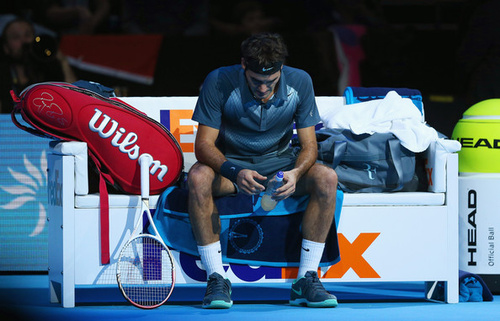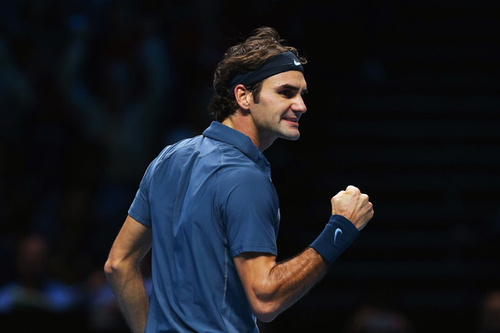Don't miss any stories → Follow Tennis View
FollowHope Rises Again for Roger Federer After Encouraging Week
As the fifth day of play drew to an anticlimactic close, the raw figures spoke loudest of all. A total of nearly 700 unforced errors had careered from the racquets of all top eight men at the World Tour Finals. With less than 500 winners to offset those errors, the message was clear. Despite the three-set battles that have run rampant at the tournament among this elite group, this had not been a vintage week of tennis for any of them, not even six-time champion Roger Federer.

Of course, stats are notoriously shady business. These tiny pockets of information are notoriously liable to manipulation and can be twisted to suit any kind of opinion. One of the questions routinely thrown up is what exactly is classed as an unforced error. It is a subjective stat that varies from event to event depending on who is doing the scoring. Moreover, the unforced error count on both sides is usually very low, irrespective of the quality, in any match involving one of the countless jumbo servers. This is because most errant returns are classed as forced errors, not included in the unforced error columns but rife in those matches.
In other matches, where the athletes are supreme and the ball is more difficult to slip past the opponent, points are salvaged with supremely difficult shots in testing positions on the court that an ordinary player could not execute. A mediocre serve and forehand combination will chalk up a winner against many opponents. But, when a player strikes four quasi-winners in a point only to miss the fifth, the final shot will invariably be classed as an unforced error and no credit given to the defense that retrieved so many punishing blows.
Still, the fact remains that uneven quality prevailed in the first five days of the World Tour Finals. Despite the generous amount of three-set showdowns, there were few genuinely interesting moments among them. In conversations outside matches, gone this week were the clichés of “playing point by point” and “fighting.” Instead, the buzzword of the World Tour Finals has been “tired”, and it has shown.
But on the sixth day something changed. In an infusion of athleticism, a dash of luck and unwaveringly certain skill, the level of the tournament suddenly rose when Roger Federer met Juan Martin Del Potro. A point that started off with Federer barely able to handle a monster serve from Del Potro rapidly escalated into something special. Del Potro scrambled up the court to deal with the return that had barely dipped inside the service box, only to see an effortlessly executed Federer forehand lob. Out of nowhere, Del Potro flicked an ungainly yet assured tweener over the Swiss star’s head, landing perfectly inside the court. Federer’s retort came with audacity, another back-to-front trick-shot but this time with Federer flicking the ball above his head. Recovery followed, and the point essentially restarted from scratch. Del Potro attacked again, but Federer held him off. The Argentine charged toward the net again, only for his opponent to reply with a dipping passing shot. Finally, a gap presented itself with Del Potro at the net but, more accurately, at sea. Federer needed no invitation, crushing a forehand into the open space and capturing the point.

It was superb, but it was not the only stunning point. There were more Swiss lobs and mouthwatering volleys of genius to come, as well as Argentine forehands which exploded off the strings with sonic energy. Neither man was at his best from start to finish, with Del Potro struggling to reproduce the consistent barrage of aggression on the slow surface in London while Federer’s game flitted between that of the Federer of a year ago and the impostor that took his place in 2013. But, in spite of their imperfections, countless moments of golden quality were witnessed
The contest as a whole was thrilling too. Three times, Federer found himself staring at the abyss of defeat as he fell down a break, and thrice he was able to recover those breaks and ultimately prove triumphant. In the first set, he diligently recovered one of the two breaks but not the other. Then, in the following two sets, two early losses of serve pointed in the direction of defeat. However, Federer refused to be defeated, recording a victory that feels immeasurably vital.
Hope for Federer is rising again, and it could be that this hope bears a positive mark on every piece of work that he carries out in the offseason, helping him mount a spirited assault on the top five once more. On the other hand, this hope could yet be squashed in the semifinals by the man who makes it his job to squash his opponents’ hopes and dreams.
And it is fair to say that nobody has had more hopes and dreams squashed by Rafael Nadal than Roger Federer.










